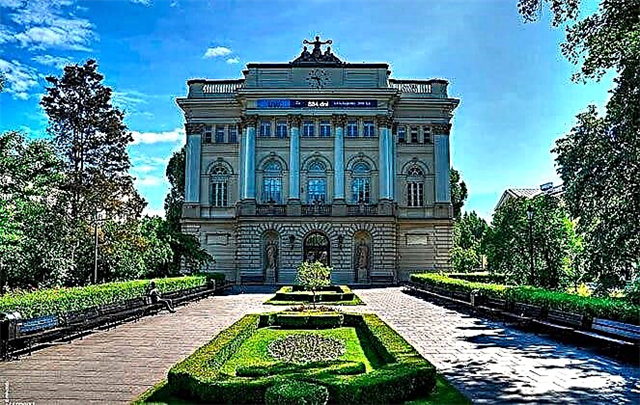Knowledge of the English language may be needed in different life situations: to study abroad, to get a high-paying job, to communicate while traveling without the help of an interpreter. Language schools in England provide the necessary knowledge and skills. In addition, such educational institutions provide an opportunity to combine the educational process with trips around the country, acquaintance with its culture and traditions.

Varieties of language programs
Those who are going to go to study at a language school should first decide for what purposes English is needed. The programs differ in content, intensity of classes, and the composition of the study group. Students are in demand for the following English courses in the UK:
- Basic (General English) - suitable for both beginners and more advanced students. The program includes grammar, speaking practice, reading, writing and listening comprehension.
- Intensive (Intensive English) - helps to learn English in a short time (from 30 lessons per week –22.5 hours).
- Business course (Business English) - an emphasis on the study of business vocabulary, the development of communication skills.
- Exam preparation courses - for those who need an international certificate confirming the level of proficiency in a foreign language. Usually preparation for IELTS and TOEFL is carried out, but there are courses to prepare for exams for obtaining Cambridge certificates (PET, FCE, CAE, CPE) or for admission to master's degree (GRE and GMAT).
- Corporate (English For Companies) - training is conducted taking into account the needs of a particular company, the main attention is paid to the terminology and vocabulary characteristic of a particular field: banking, medicine, tourism, law, aviation.
- Individual (Individual Courses) - the program is focused on the personal goals and characteristics of the student.
- Family courses - parents are given the opportunity to learn a language or get to know the country in parallel with their children while the child is studying.
- For teachers (English for Teachers) - designed for practicing teachers who want to improve their knowledge and skills.
- Language plus hobby (English + Hobby) - a combination of classes with your favorite hobby: yoga, cooking, photography.
Best English language learning centers
 A large number of schools are concentrated in London. Training in them can be combined with sightseeing. But it is better to choose an educational institution in a small town where you can fully immerse yourself in the language environment. In addition, the cost will be slightly lower than in the capital's schools.
A large number of schools are concentrated in London. Training in them can be combined with sightseeing. But it is better to choose an educational institution in a small town where you can fully immerse yourself in the language environment. In addition, the cost will be slightly lower than in the capital's schools.
All schools are modern, have excellent technical equipment, and the organization of the educational process is excellent. It is worth taking a closer look at such language centers:
- Twin English Center London (englishcentres.co.uk) is located 20 minutes from central London. There is a swimming pool, a large library. Courses are available in Eastbourne and Dublin. The cost of teaching English in England at this school is £ 125-320 (10 230-26 200 rubles) per week of stay.
- St Giles International (stgiles-international.com) has been conducting educational activities since 1955. The centers are located in London: the intellectual Bloomsbury district and the tranquil green Highgate. And also in Brighton, Cambridge, Eastbourne. Much attention is paid to the quality of teaching. Classes are equipped with interactive whiteboards, computer equipment. The school is attended by students of different ages and nationalities. For a week of training, you will have to pay from £ 252 (20 615 rubles).
- EC Oxford English (ecenglish.com) is located in Oxford, famous for its oldest university. Offers a wide range of courses for students with different basic levels of language proficiency. The centers are located in Cambridge, Bristol, Manchester, Brighton. Estimated cost - from 270 £ (22,100 rubles) per week.
- Kaplan International Languages (kaplaninternational.com) attracts students from all over the world. In London, it is located in the distinctive area of Covent Garden, which is famous for a variety of theaters, and the glamorous Leicester Square. The school is also represented in other cities: Bath, Bournemouth, Cambridge, Edinburgh, Liverpool, Manchester, Oxford, Torquay. Ideal for those who need the language for work, study at a foreign university, immigration. The price of weekly courses is from £ 295 (24,200 rubles).
- CES Leeds (ces-schools.com/leeds) is located in downtown Leeds. Nearby - shopping streets, interesting sights. Has been conducting educational activities since 1979. The technical equipment of the classrooms meets high standards. The approximate cost of the courses is from £ 180 (14,700 rubles).
For more information on the most recognizable and not-so-famous universities in the UK, see the article “The Best Universities in the UK: General Information and Admissions Considerations”.
 In addition to these institutions, the opportunity to study is provided by winter and summer English schools in England. Their main difference from courses is that much attention is paid to entertainment.
In addition to these institutions, the opportunity to study is provided by winter and summer English schools in England. Their main difference from courses is that much attention is paid to entertainment.
In the summer after lessons, the guys go in for football, equestrian sports, yachting, go on excursions, in winter they attend creative master classes. Such hobby classes contribute to the consolidation of the acquired knowledge. Summer courses are designed for children and adolescents between the ages of 8 and 18.
Many options for conducting language camps for children and youth are proposed for consideration in the article "How to send a child to an international children's camp in England".
Admission procedure and conditions
Anyone can become a student of an English language school. As a rule, it is enough to have an idea of the English alphabet, to know the basic words to understand the simplest phrases, to be able to answer questions about the name, age, home country.
For courses such as business programs, intensive, preparation for international exams, you will need an intermediate level of English.
Enrollment in the program is carried out according to the following scheme:
- choice of direction of language learning;
- filling out an application form on the school website or online service for searching for language courses abroad;
- preparation of documents;
- payment of tuition and registration fee;
- receiving confirmation of enrollment from the school;
- registration of a student visa;
- selection of accommodation options (if necessary).
Preparation of documents
 One of the important steps is obtaining a student visa. An application to the embassy can be submitted 3 months before the date of the trip, but no later than 3 weeks before the start of the training.
One of the important steps is obtaining a student visa. An application to the embassy can be submitted 3 months before the date of the trip, but no later than 3 weeks before the start of the training.
Information on the types of visas and a list of papers can be found on the website of the British Embassy - gov.uk.
The standard package of documents includes:
- valid foreign passport;
- proof of solvency;
- a letter of enrollment for the courses indicating their name, duration and cost;
- tuberculosis test results (if the training period is more than 6 months);
- receipt for payment of courses, as well as consular fees;
- information about the place of residence and details of the trip;
- educational documents (certificate, diploma, certificate, language certificate) or a certificate from the place of study;
- for minors - notarized parental consent to leave.
On a trip, you need to take a passport with a visa, a document from the school confirming the fact of enrollment in a language program, medical insurance, air tickets.
Take a sociological survey!
Where do students live
Language schools offer booking services for two types of accommodation:
- Host family - gives you the opportunity to immerse yourself in the language environment, immerse yourself in the culture and traditions of the country, and participate in family events. Families are carefully selected by the school administration. Students live in a single or double room, they are provided with meals (optional).
- A student residence is an option for independent, sociable people who want to make new friends.The schools cooperate with many hostels located in different parts of the city. There are single and double rooms equipped with a kitchenette, sofa, desk, wardrobe. You can choose between meal options: breakfast only, half board, full board.
Students can rent an apartment or a hotel room on their own.
How much money to take with you
Additional costs should be included in your travel budget to the UK. In order for you to be able to navigate the prices, we give the approximate cost:
- consular fee - from 97 £ (7 960 rubles);
- medical insurance - £ 10 (800 rubles);
- round-trip air tickets - £ 100 (8,200 rubles);
- transfer - 80-110 £ (from 6 359 to 9 085 rubles one way)
- accommodation in a host family - from £ 195 (15 600 rubles), in a residence - from 285 £ (23 380 rubles) per week;
- food, travel and pocket money - £ 300-400 per week (24,600-32,800 rubles).
The indicative prices given in the article "Price level in England" will help you to decide on the budget.
Is it possible to work
Students who have received a short-term study visa are prohibited from working in the country. Illegal employment entails negative consequences such as deportation from the UK or a travel ban for up to 10 years.
Long-term student visa (General student visa - Tier 4) entitles you to work no more than 10 hours a week. During vacations, you can work full time.
It is important to remember that absenteeism is not encouraged in language schools. If a student treats education in bad faith, the teacher has the right to file a complaint with the Department of Immigration Policy. And this is fraught with big trouble.
Pros and cons of English language courses
A trip to study English in England has pros and cons. It is worth noting the following advantages:
- Britain is the birthplace of traditional English, which is recognized as the reference language and is considered the most correct in terms of grammar.
- A large selection of modern schools in different cities of the country.
- The ability to fully immerse yourself in the language environment.
- After completing the courses, you can continue your studies at a prestigious university and get the most promising education in the world.
- Lessons are held in an informal friendly atmosphere.
- The ability to combine study with work (with a Tier 4 General Student Visa).
The disadvantages include:
- high tuition fees;
- accommodation, meals, flights are expensive;
- the risk of not refunding money (prepayment for tuition) in case of visa refusal.
In order not to regret spoiled nerves and ineffectively spent money, you should take seriously the choice of school and program, the preparation of documents and the requirements of immigration legislation.











